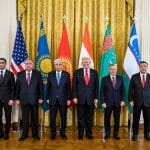Following Iran’s massive, but ineffective, missile and drone strikes against Israel April 13, the United States and the United Kingdom announced their new sanctions measures on April 18 and the EU finally approved its latest Iran sanctions strategy on April 22, with more time needed for full implementation.
Iran had already been under various levels of U.S., EU, and U.K. sanctions for its sales of Shahed “kamikaze” Unmanned Aerial Vehicles (UAVs) to Russia, regularly used against Ukraine.
On April 18, the U.S. Government announced new actions against several actors involved in Iran’s UAV program, suppliers, and customers of one of Iran’s largest steel producers, and Iranian automobile companies with connections to U.S.-designated entities Islamic Revolutionary Guard Corps (IRGC) and the Ministry of Defense and Armed Forces Logistics (MODAFL). While most sanctions are administered by the U.S. Treasury Department, the U.S. Department of Commerce also imposed tough new controls to restrict Iran’s access to technologies such as basic commercial grade microelectronics. In making this announcement, Washington stressed that these new controls also apply to items manufactured outside the U.S. that are produced using U.S. technology. On April 23, Washington also announced new sanctions against two companies and four individuals involved in malicious cyber activity on behalf of the Iranian Islamic Revolutionary Guard Corps Cyber Electronic Command (IRGC-CEC).
Concurrently with Washington, London imposed sanctions targeting several Iranian military organizations, individuals and entities involved in Iran’s UAV and ballistic missile industries.
EU takes cautious new steps
The EU is well known, if not world famous, for its toothless sanctions programs vice Iran, one of the key reasons Israel has chosen to ignore most of the EU’s advice on other Middle East issues. The latest expansion of the EU Iran sanctions program was endorsed on April 22 by the EU Foreign Affairs Ministers meeting in Luxembourg and is expected to enter into force in the coming days once the political agreement is translated into the required documents and formally approved. The new sanctions are reportedly planned to cover Iranian activities across the entire region of the Middle East and Red Sea, which would mark a strengthening of EU efforts, if ultimately implemented.
The EU had previously set up a sanctions regime, following western allies, to target Iranian-made Shahed drones, which Tehran has provided to Moscow. These low-tech drones have been used against Ukraine’s critical infrastructure and residential buildings, killing dozens, and possibly hundreds, of Ukrainians. These same drones, launched from Iran, were easily shot down by Israeli and allied defenders on April 13.
The existing EU Russia sanctions scheme has also blacklisted people and entities involved in Iran’s UAV program through travel bans and asset-freezing measures. New anti-Iran measures are designed to reduce the exports of EU-made components used in the production of Iranian drones and ballistic missiles. The EU reportedly began working on an expanded set of sanctions to cover the production of missiles and to enlarge the existing catalogue of prohibited drone-related components, but this does not appear to approach the scope of the new U.S. bans on sales of microelectronic components.
Iran’s Foreign Minister Hossein Amirabdollahian posted on X on April 23, “It is regrettable to see the EU deciding quickly to apply more unlawful restrictions against Iran just because Iran exercised its right to self-defense in the face of Israel’s reckless aggression,” later suggesting the EU should sanction Israel instead.
EU Foreign Ministers, however, did not make any moves towards the listing of the Islamic Revolutionary Guard Corps (IRGC) as a terrorist organization, an idea that has been under consideration since the crackdown on the anti-government protests which erupted last year in the aftermath of the killing of Mahsa Amini.
Apologists for the EU’s weak policy argue that such a designation would first require a judicial decision by a competent authority in any of the 27 member states, which could then be repackaged as the legal basis for an EU-wide decision.







